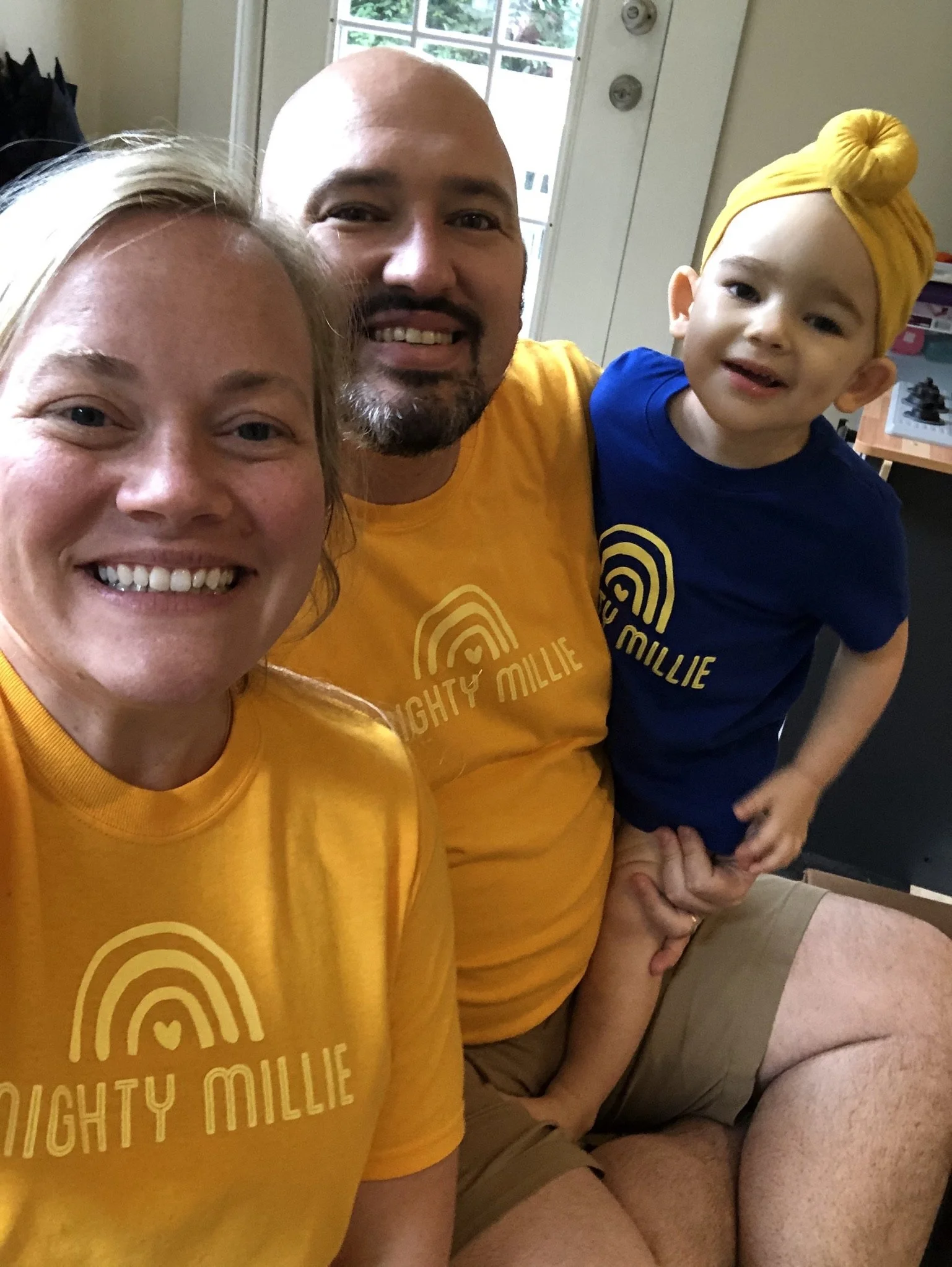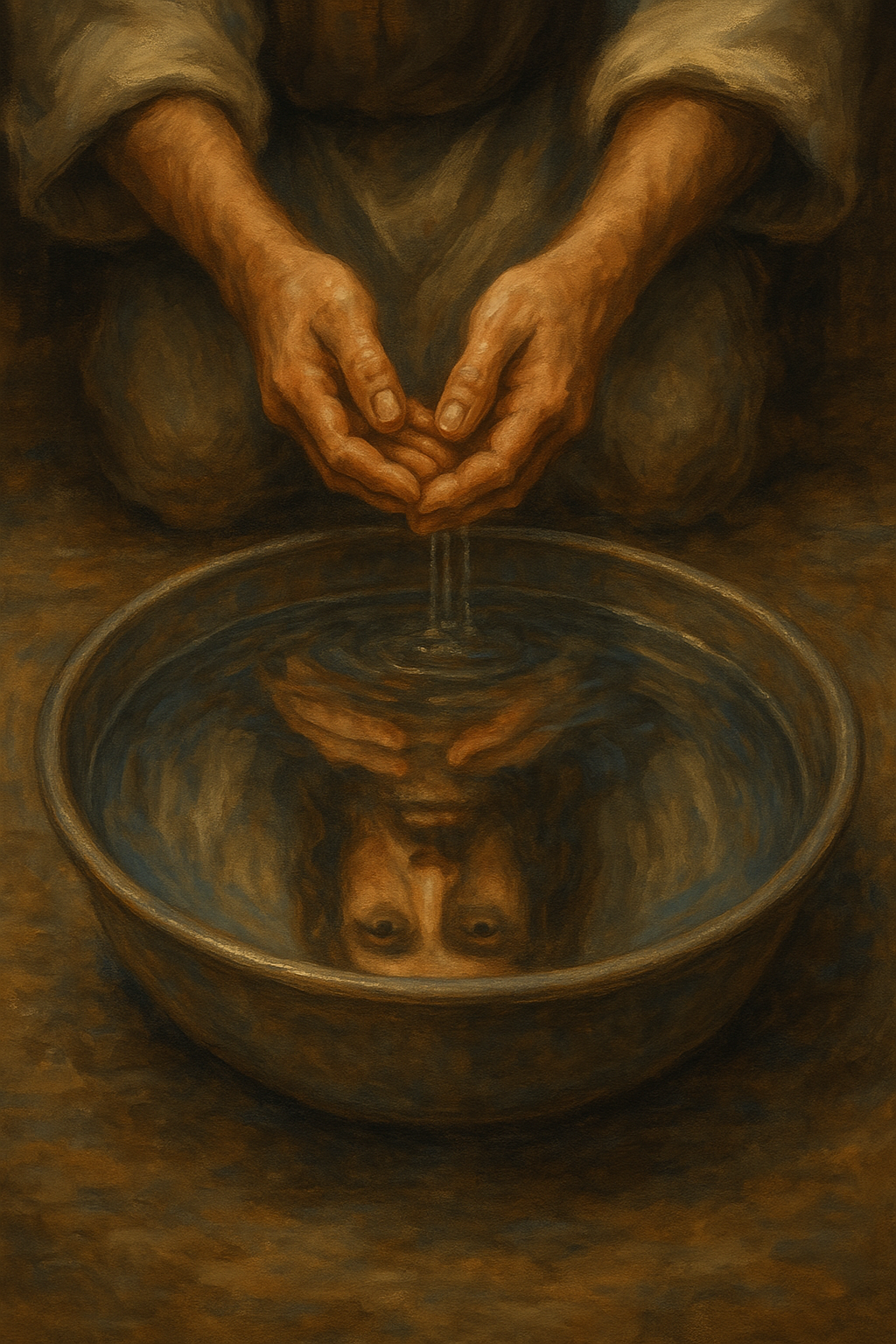13.1 - Clarity, Courage, and Love in Action
Facing the Bad News First
John begins chapter 13 with a stark line: “Jesus knew his hour had come.” No avoidance. No sugarcoating. He looked reality in the eye, matching its ugly stare.
When we face bad news squarely, clarity comes. Not comfort, but clarity. Denial only prolongs the illusion. It’s like staring at the scattered pieces of the puzzle we’ve discussed: no picture, no guidance. But the moment you get a glimpse of the box top, you see how it fits. You may not like it, but at least you know. And once you know, you can gather courage.
I’ve seen this lived out. When the doctors “threw in the towel” on Millie’s rhabdomyosarcoma, declaring there were no more options, it was as if a heavy, dark cloud finally revealed its lining. Not silver, but real. Something we could hold.
The courage of Millie’s parents in that moment was palpable. They pivoted instantly from battling disease to creating joy. Their mission was singular: make her smile. Christmas came early. Stockings were filled. Gifts were unwrapped ahead of schedule. And every giggle, every moment of delight was multiplied because courage had replaced illusion.
To my grandchildren and to your children after you: face the bad news first. Gain clarity. Then summon your courage. Dancing with delusion, no matter how convenient, solves nothing. Only truth prepares you for love.
“Face the bad news first. Clarity is the beginning of courage.”
The Silence of a Gesture
What happens next is breathtaking. Jesus, fully aware of the darkness ahead and that the decision was entirely in his hands, chooses to speak without words. He sets his decision in motion. Jesus could have chosen differently. He could have stacked the dishes, slipped quietly into the night, and lived to teach and heal another day. But he didn’t. With full awareness that the darkness was near and that the decision was his to make, he stayed. He knelt. He served.
John describes it almost in slow motion, as though he wants us to feel the astonishment he felt: He got up. He laid aside his robe. He took a towel. He girded himself. He poured water. Only then did he wash.
Imagine how long this took. From “he got up” to the first foot - was it a minute? Five minutes? Each verb is a puzzle piece, slowly clicking into place in front of John’s eyes. Nothing spoken. Yet volumes received.
Sometimes the loudest sermon is silence. In a culture of rank and ritual, Jesus lowers himself to the posture of a servant. No pedestal. Just naked knees on a wooden floor.
And this was no performance. It was obedience to his inner compass. Again and again, Jesus acted only as his spiritual consciousness directed. Sometimes it looked aloof - like leaving a crowd still begging for healing, or retreating alone into the hills when everyone wanted more. But it wasn’t detachment. It was alignment.
He was putting his oxygen mask on first before helping others. Strength first, then service. If we don’t breathe, we can’t help anyone else. Jesus, in tuning his life so carefully to his inner guidance, knew exactly when to act and when to wait. That clarity gave him the strength to love with courage.
Dallas Willard once defined love as willing the long-term best interest of another. That kind of love is not reactive or compulsive. It is steady, discerning, purposeful. Jesus wasn’t serving everyone in every moment - but he was serving someone in the right moment.
“Love is not performance—it is obedience to inner clarity.”
Setting Self Aside
Paul would later refer to this as kenosis, or self-emptying. The Son of God, fully aware of his divine identity, chose not to cling to power, position, or privilege. He set them aside and leveraged his being for the sake of others.
That is not natural to us. Human beings are wired for survival. We grasp for security, recognition, and advantage. Therefore, power, wealth, and status are survival tools dressed in modern clothes. Historians tell us that our species has survived not only by fighting predators but also by organizing around hierarchies of dominance. So, rank feels natural because it once kept us alive.
“Like the social insects, Sapiens lived in groups. Unlike the social insects, they could adapt their social behavior to different situations. This flexibility made it possible for them to band together in large numbers, and thereby outcompete all other human and animal species.”
However, Jesus reveals a deeper code. The call is not to erase identity but to release our grip on its privileges. To use our identity and resources for the flourishing of others - to love our neighbor.
To my grandchildren: you will feel the pull of survival instincts - status, applause, possessions. Don’t be surprised by it. But remember: your true strength is found not in clinging, but in emptying. When you know who you are, you can set it aside for others without losing yourself.
Equal, Not Ranked
After the washing, Jesus asks his disciples: “Do you understand what I have done for you?” Then he explains. He acknowledges their cultural language of master and servant, but turns it upside down: “If I, your Lord and Teacher, have washed your feet, you also ought to wash one another’s feet.”
Rank is cultural, an imagined reality, not eternal. Teacher and student, master and servant - these are roles, not measures of worth. In spiritual consciousness, all are equal.
Eugene Kennedy wrote that the tragedy of adulthood is that we allow the “false self” imposed by culture to drown out the “true self” given at birth. By the time we grow, cultural programming has overwritten the original code: every life is equal in worth.
But the code is not gone. It can be reinstalled.
Training in Equality
Like any code, the original must be restored through practice. Jesus offers a way of training:
Spend time in silence. Imagine a world without rank. None greater or lesser.
Notice people. When you meet someone important, notice your instinct to defer to them. When you meet someone ordinary, notice your tendency to dismiss.
Recognize roles, not ranks. A teacher has a role, but no greater worth than the student. A janitor has a role, but no less worthy than the principal.
Apply truth over norm. Instead of inventing religious tasks, act on the nudge of consciousness. Sometimes it’s as simple as offering a smile.
At first, the training feels awkward. You’ll notice how much you bend toward wealth, beauty, or power. But slowly, the eyes of the heart recalibrate. Equality becomes visible.
Karen Armstrong reminds us that compassion is the root of all faith traditions: to suffer with, to treat the other as equal. And compassion doesn’t fall out of the sky. It requires training.
Admire or Follow?
Here lies the tension. Many times, I put Jesus so high on a pedestal that following him feels impossible. I admire him, rather than imitating him. But admiration without imitation leaves us unchanged.
Jesus was never simply a figure to worship but a teacher to follow into transformation. He never said, “Worship me from a distance.” He said, “Follow me.”
Following doesn’t mean instant perfection. It means daily training. Daniel Kahneman taught us that our brains resist slow, incremental work. We crave quick wins. However, discipleship is not instant - it is a daily process of improvement and realignment.
In this light, Repentance is the continual desire to improve. It is every small step toward clarity, courage, humility, and love.
“Do not chase forgiveness.
Chase becoming.
Forgiveness will find you.”
The Code of Our Being
The first half of John 13 is more than an ancient scene with a towel and basin. It is a reintroduction to our true design. Jesus did not despise rank, but he refused to recognize it as ultimate. He acted from a deeper code - one written into the marrow of creation.
Pat Conroy, in writing about family, once said that every human carries both light and darkness in the same breath. The work of life is not to deny the darkness but to choose again and again to bring light.
So it is here: the choice to face bad news instead of denial, to draw courage from clarity, to set aside privilege for the sake of others, to train daily in equality, to follow instead of merely admire.
To my grandchildren: the world will constantly invite you to dance with delusion, to measure yourself by rank, wealth, or applause. But beneath that noise, there is another code. Reinstall it. Train in it. And watch how courage, clarity, and love multiply.
📌 Key Takeaways
Real love requires clarity and presence, not denial.
Rank and status are illusions; all are equal in worth.
Our lives are for the benefit of others - love in action.
Serving others flows best from inner strength and training.
Discipleship is not about perfection, but rather about daily, courageous improvement.





